Course:ASIA325/2023/Feminism from the Perspective of Female Directors: All About Love
Feminism from the Perspective of Female Directors: All About Love
Group Members' Contributions
- Introduction: Q L
- Stories Behind the Film Production: Q L
- Histories of Reception: Q L
- Scholarly Literature Review: Q M
- Comparative Analysis: Z Z
- An Alternative Interpretation: J L
- conclusion: Q L
Introduction
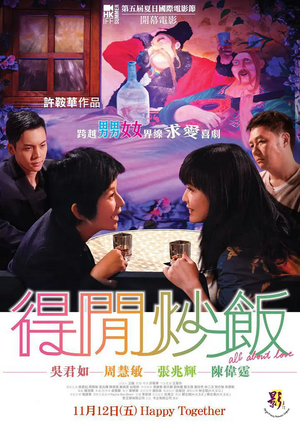
All About Love, directed by Ann Hui, is a Hong Kong film released in 2010. It explores various feminist concerns from lesbian perspective, including women’s self-awareness, gender role transformation, gender stereotypes and so on. The feminist ideas expressed by Ann Hui as a female director will be deconstructed and sorted out. The protagonists Macy and Anita are portrayed by Sandra Ng and Vivian Chow. Macy and Anita are former lovers who are pregnant after a one-night stand and coincidentally meet again at a charity for single mothers. They consider getting back together since they both still have feelings for each other; meanwhile, Anita considers terminating the pregnancy. This decision brings the children's fathers, Robert and Mike, played by Siu Fai Cheung and William Chan, get involved, as well as Macy's friends, Wai Wai and Eleanor, played by Jo Koo and Joey Meng Wan. After going through many ups and downs and hardships, they finally come together and find a way to move forward.
In this entire wiki, the story and inspiration behind the film will be collected and collated through interviews with Ann Hui, as well as other critical material about All About Love. The film's reception will also be analyzed by examining reviews of the film from different communities. Additionally, valuable insights from existing academic literature on the film will also be compiled. Moreover, a comparison between this film and Farewell, My Concubine, directed by Kaige Chen, will also be presented in the following work to discuss the topic of LGBTQ+ community, gender identity and gender perception. Based on the collected and analyzed critical and literary material from different sources, an alternative interpretation will also be given, focusing on the traditional gender stereotypes, postmodern feminism discourse, and nonlinear narratives. Throughout this wiki, a deeper understanding of this seminal film and its significance in contemporary cinema should be expected.
Stories Behind the Film
All About Love was inspired by a true story of a friend of the screenwriter Yee-Shan Yeung. It tells the story of a former lesbian couple who meet again at a charity for children and pregnant women. Meanwhile, Hui wanted to incorporate a lesbian story into her female-themed films, then Yeung suggested this story. Hui and Yeung were attracted by the story and decided to use it as the basis for their All About Love. However, the sensitivity of the story itself led to a situation where the film did not attract any investors at first.[1]
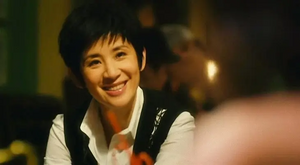
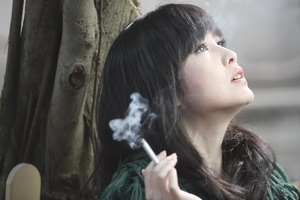
A well-known filmmaker in Hong Kong, Wong Jing, was one of the investors. Besides investing in the film, Wong also provided valuable input in other aspects. The Chinese title of the film, "得閒炒飯", was derived from him. The word "得閒" in Cantonese refers to “have time”, and "炒飯" refers to “fried rice”. However, the title does not mean “having fried rice when you have time”. Indeed, the word "炒飯" refers to “make love” in Taiwanese slang culture. Hence, "得閒炒飯", “making love at leisure”, suggests the complexity of the relationships between the characters in the story.[2] Wong also suggested that the film should cast well-known actresses, and unexpectedly, the actresses of the two protagonists, Sandra Ng and Vivian Chow, both liked the script and agreed to participate willingly and immediately. And they also gave some valuable opinions on the script during the shooting.[3][4] As well-known actresses in Hong Kong, Ng is a comedy queen, and Chow is known as "宅男女神" (which means a fantasy girl for homebody), their participation in this film provided more exposure in a way.
A notable fact is that neither Hui nor the two lead actresses are not lesbian. To ensure the authenticity of the film, Hui conducted pre-production research on the local LGBTQ+ community in Hong Kong and arranged for Chow to experience a real lesbian life in a lesbian bar.[4] Another intersting thing is although the film is one of Hui's many acclaimed works on female topics, such as A Simple Life and Summer Snow, Hui states that she is not a feminist and explains that the film is not exclusively concerned about lesbian suffering but tends to reflect on some social concerns through a lesbian perspective in a comedic way.[1] Surprisingly, Hui's feminist ideas are in fact profoundly analyzed and deconstructed in much of the critical and literary material.
Histories of the Film’s Reception
Hong Kong cinema experienced decline from the 1990s onwards, the industry had come to rely heavily on the mainland Chinese market as its primary market. Although Hui expressed her desire for this film to be released in mainland China, where the homosexual genre has been implicitly silenced in mainland China.[5] Around 2010, there were far more people against the homosexual community in Hong Kong than those who supported it.[6] This was also one of the reasons for the commercial failure of the film. After the failure of Hong Kong films to reach overseas markets, All About Love was only released in Taiwan and Singapore. Although Hui mentioned that the film was being acclaimed at some special screenings events, the film did not succeed at the final box office.[1]
Historically, Hong Kong cinema industries have always relied heavily on commercial films. Although All About Love is not a commercial film. Hui believes that turning a serious drama into a comedy might be more appealing to audiences.[7] However, Hui found some negative reviews, after its initial release, claiming that the film was too frivolous and should have taken a more serious approach to the issue of lesbians in Hong Kong.[8] But there were also those who were pleasantly surprised by Hui's ability to make a romantic and heartwarming film about such a serious subject.[9]
The film, All About Love, failed both at the box office and in the streaming reviews till nowadays. As a result, there were relatively few critical reviews of the film, especially in non-Chinese speaking communities, much of them were published during the period of the film's initial release. Firstly, All About Love does have a certain amount of sparkle and appeal, but it's all buried under the controversy about the form of comedy.[10] Despite being a comedy, the film takes a more documentary approach, shedding light on various social issues related to feminism, such as single motherhood, homosexual marriage, and so on.[11] Whereas the film failed to effectively convey valuable messages on feminism topics, instead only touching lightly upon them, which makes the story weaker.[12]
Regarding the comedy controversy, there is basically no difference in the film's reception among the Mandarin and Cantonese-speaking communities. In the period of the film's initial release, the Chinese community highly criticized the shallow treatment of the themes. A decade after its release, the online Douban community's reception of the film shows no obvious difference in the reception by observing the online film review communities.[13]
Scholarly Literature Review
Many people have studied the feminine issues related to the film All About Love, including female self-perception, gender role transformation, female identity and social status. These issues are all relevant to the lived experiences of modern women and have important implications for feminist studies.
There is existing literature that proves that the gender temperament of men and women is not innate, but socially constructed.[14] Society imposes too many demands and regulations on women, which creates a state where women are suppressed by men in their lives.[14] Previous research has confirmed that the patriarchal society creates gender inequality, suppresses women's rights, and limits their social status and autonomy. Patriarchy reinforces gender stereotypical influences and exaggerates gender differences between men and women making men's position higher.[15] However, patriarchal societies also have some negative effects on men. The literature supports this view with specific and sufficient examples, where fathers are always superior in society and are ridiculed when there are fathers caring for children or becoming full-time fathers.[15] Thus, some literature argues that patriarchy is also a restriction on men, who are expected to be strong and not afraid of hardship,[15] they must earn money to support the family and cannot show their vulnerable side.[16]
A series of recent studies have shown that gender and desires are not fixed, and that people's sexual identities and orientations should change all the time.[14] Patriarchy has made women stereotypical and passively suppressed by men, and this stereotype is deeply rooted in people's minds. However, with the emergence of female filmmakers, there are more female viewpoints in films,[17] so that they can better show different perspectives. All About Love, a film directed by Ann Hui, describes the experiences of women in Hong Kong through a female perspective, subverting gender stereotypes.[17] Researchers have become increasingly interested in gender stereotypical images, arguing that when removed from the male perspective, gender traits are not absolute opposites, and that women differ from each other only because of individual diversity, i.e., different personalities.[15] In this film, the influence of traditional gender stereotypes is completely overturned; it allows men and women to be free from gender stereotypes and social constraints, and they can realize themselves as they wish.[14] For example, dressing does not have to be gender specific, unisex dressing can subvert gender patterns,[15] women can be sexy or cool and handsome, and men can be childish and swayed by their feelings.[14] The film's protagonist obscures the boundaries between men and women, and it is brave enough to show everything feminine, including sexual pleasure.[16]
There is a growing body of literature examining post-feminism, which refers to the fact that although progress has been made through feminism, women still face a lot of inequality and discrimination.[17] Postmodern feminism has switched from focusing only on things to discourse, as men and women speak different languages, and the literature suggests that women's ambitions can be achieved by creating a uniquely female discourse.[16] However, post-feminism refers to some research on the Western female experience, but ignores women in other regions.[17] The film All About Love, shows the theory and core of feminism by depicting women in Hong Kong. The film specifically shows the third stage of feminism by focusing on female identity and discourse, adopting femininity and declarations to present the core of feminism.[16] At the same time the film deals with the theory of the Queer, challenging the gender status quo in a more intense state, going beyond traditional homosexuality and rebelling against the male-centered social status quo and questioning the phenomenon.[14]
There are a lot of double standards between men and women in real life, and there is no sexual equality for women, while this film fights for women's sexual freedom, where women have their own independent sexual needs and can build an ideal life through their own rights.[14] The biggest obstacle to freedom of sexual orientation in real life comes from heteronormative hegemony, and Yang Fan argues that there is no influence from the heteronormative mainstream in the film.[15] However, there is some controversy over this issue, as Huang Shan argues that the female protagonist in the film gains power through a fake marriage as a compromise to heteronormative hegemony.[14] Marriage is sacred, but in the film, it is used as a tool and becomes a deformed form of oppression.[15] Thus, the film argues for the need to accommodate not only same-sex couples, sham marriages, but even sexual relationships outside of marriage, children outside of marriage, and unwed mothers.[15]
This literature provides an in-depth interpretation of the feminism presented in the film All About Love, showing the emotions of marginalized groups such as female lesbians, gays and bisexuals in a patriarchal society and questioning the oppression of male and female women by patriarchy. It shows the challenges and pressures faced by modern women in the family, workplace and other fields. It explores the subversion of gender stereotypes in the film and analyzes the impact of post-feminism and Queer theory, presenting a more complex perception of social status and gender.
Comparative Analysis
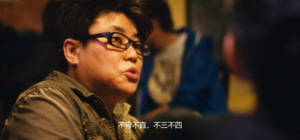
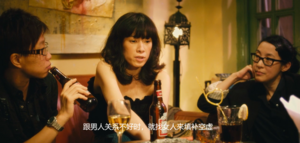

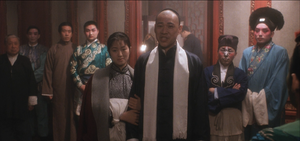
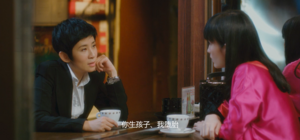

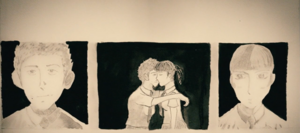
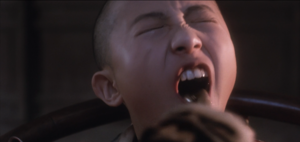
When discussing Ann Hui’s movie All About Love, it is almost impossible to avoid the topic of gender identity and the LGBTQ+ community’s survival status within the Chinese society. What is more, there is another famous Chinese LGBTQ+ movie that is worth mentioning here, as a comparison to All About Love. The name is Farewell, My Concubine. It was made by Kaige Chen in 1993, starring Leslie Cheung and Gong Li.
For starters, it is quite easy to notice the historical backgrounds of these two films are very different. All About Love, is set in modern-day Hong Kong, and most of the characters in this film are tolerant and understanding of homosexuality in this "westernized" historical environment. In such a setting, nevertheless, the homosexuals in the film face the plight of exclusion. For example, Macy, a bisexual woman, is invited to a lesbian party and is told that "bisexuals are all just messing around; they play with men and women and switch around a lot if they get bored." This statement was supported by many of the lesbians in the room.
Such an bisexual stereotype can indicate that bisexuals are excluded from the gay community. Therefore, their relationships are not treated like those of "normal" gay people. Surprisingly, the protagonists in FarewThis statement was supported by many of the lesbians in the room. Such an alienatingell My Concubine face a similar dilemma in a completely different historical context. The tragic story takes place in Mainland China during the twentieth century, from the early days of the Republic of China to the post-reform and opening-up period. At the time, mainland China was undergoing massive upheaval. People were generally ignorant, and homosexual relationships were viewed as sick and abnormal under Confucianism's baptism. The homosexual community was unusual and undervalued. When Cheng Dieyi arrives at Duan Xiaolou's wedding and acts impatiently, insulting Duan Xiaolou's wife, Juxian, in public, Xiaolou scolds Dieyi, "I'm the fake king, you're the real concubine!" (1:07:21) In this way, Duan Xiaolou denied and alienated Dieyi's love for him. But because the two of them were like brothers who had spent their entire lives together, it was impossible for Xiaolou not to understand Dieyi's feelings for him. But because he didn't understand and didn't want to accept this feeling, he dismissed Dieyi's love for him as a false conjecture.
Second, while the protagonists in the two films have different perceptions of their own gender, they both depict the hegemonic masculinity of the two eras and societies. In All About Love, the female protagonist, Macy, clearly defines herself as a "lesbian," that is, she sees herself as a woman. This gender perception is "correct" and socially acceptable. Nonetheless, she always dresses masculinely. She also cuts her hair short; in contrast to Anita, who has long hair and is more "feminine," Macy appears to have become the "male" in the relationship. This became evident when Macy told Anita, "You have the baby; I'll have an abortion." (1:19:21) Macy takes a completely masculine role in a relationship between two women in order to fill the absence of men in their relationship. Despite the fact that Macy frequently discusses gender politics with her friends and supports affirmative action, her behaviour is a bow to a male-hegemonic society and a social definition of the need for a male in a relationship. On the other hand, in Farewell, My Concubine, Cheng Dieyi's perception of his own gender is muddled. Since he was a child, he has been forced by his teacher to call himself a "girl" in the theatre, and abandoning his identity as a “boy”. Dieyi's femininity is obvious from his voice and gestures, and his femininity also compensates for the lack of women in his relationship with Xiaolou. However, in twentieth-century mainland China, such gender perceptions are wrong; once a man becomes feminine, he becomes inferior. So, despite the fact that Dieyi fills the female role in the relationship, Xiaolou ends up with a "real" woman rather than a man who has chosen an "inferior" identity in a patriarchal society.
Finally, let us take into account of "when" the protagonists in these two films change their gender perceptions and sexual orientation. It is when they are underage, Macy, Anita, and Cheng Dieyi all confirm their sexual orientation or change their gender perceptions for the first time. But how did the three of them end up being so distinguishable? It's because Macy and Anita both chose to be lesbians. They fell in love in their middle school, and no one forced them to do so. Thus, in the end, they were able to stay together and enjoy their relationship, which had previously failed to bear fruit. But Dieyi was different; he had been abused both physically and mentally. When he refuses to say he is a "girl," he is subjected not only to physical punishment (such as having his mouth burned by a hot pipe), but also tormented by the natural reverence and fear of his master that he carries in his bones from Chinese tradition. Dieyi's change in gender perception and sexual orientation is not his choice but a result of his social environment and upbringing. Therefore, in the end, when Dieyi wakes up from his dream, the strong sense of cognitive tearing makes him go crazy and makes him choose to kill himself in front of the love of his life.
In general, despite the fact that the stories of Chinese Hong Kong director Ann Hui's film All About Love and mainland Chinese director Chen Kaige's film Farewell, My Concubine are set in very different time periods, and that the protagonists of the two films are completely different in terms of gender and gender perception, they both reveal the plight of the Chinese LGBTQ+ community under the hegemonic male society from different perspectives. Even though both films' characters and plots are made up, the social realities they depict are real. Therefore , as an audience, we must seriously consider and investigate these issues in order to fight for greater equality and respect for the LGBTQ+ community, as well as to make greater contributions to pluralistic gender identity and gender equality in modern society.
Alternative Interpretation
Traditional Gender Stereotypes
Although many scholars point out that the movie All About Love, is a subversion of traditional gender stereotypes, judging from the actual content of the movie, this movie’s criticism of traditional gender stereotypes is superficial. In Huang Shan's research, she pointed out that the film describes a class of lesbians with traditional masculinity, who are not dependent on men for financial support and are self-sufficient. And Macy is the most representative and characteristic character in this kind of lesbian group. Women like Macy can switch between homosexual and heterosexuality groups, while men are drawn by emotions, and male characters are described as depressed and childish and lack of judgment.[14] In short, Huang Shan believes that the non-traditional gender temperament displayed by women and men in the film is a subversion of traditional gender stereotypes. Unfortunately, Huang Shan's point of view is not a universal assertion even in the film.
At the beginning of the movie, the camera follows Macy into a bar where lesbians are the main customers. Macy participates in issues discussed in the lesbian community. This lesbian group wants to discuss some issues about women's gender politics in a patriarchal society. Macy doesn't want to speak too much on the topic of gender politics, but she has been questioned by others whether she is a lesbian. After Macy admitted that he is bisexual, the crowd expressed disdain for Macy. Then Macy began to express her views on gender politics and tried to defend the right of bisexuals to speak. But Macy's behavior aroused deeper disdain from others. From here we can see that the source of the conflict between Macy and others comes from the disagreement between radical feminism and postmodern feminism, and Ann Hui, as the director, uses Macy's lines as a weapon to criticize radical feminism. From the relationship between the characters in the movie, Macy and other gender-neutral lesbians did not complete the subversion of traditional gender stereotypes together. Huang Shan believes that the non-gender dressing and masculinity of the lesbian group in the film is a subversion of traditional masculinity, and Macy has criticized this view from a postmodern feminist standpoint in the film. From this perspective, the film does not rely on the female perspective to complete the subversion of the gender temperament under the traditional mainstream culture. On the contrary, the director borrowed the character of Macy to some extent to defend people's right to retain gender diversity and sexual orientation diversity. And interestingly, in the movie, postmodern feminists like Macy are not mainstream in the movie. And in the film, postmodern feminists like Macy are not mainstream in this lesbian-themed movie. Director Ann Hui pointed out a sharp problem from Macy's perspective. Even among feminists, different ideologies of feminism cannot reach a consensus. And it is the non-unity of various ideologies under feminism that creates postmodern feminism's position of emphasizing the diversity of discourse power.
Postmodern Feminism Discourse and Nonlinear Narratives
In Cheng Pengfei's research, he pointed out that postmodern feminism emphasizes discourse rather than specific things.[16] In the eyes of postmodernists, discourse is power. In the viewpoint of postmodern feminists, the discourse systems of men and women are not the same. Men's discourse are "linear, defined, structured, rational, and consistent", while women's discourse are "fluid, centerless, playful, fragmented, and open-ended"[16] In the movie All About Love, Ann Hui, who is good at Hollywood narrative mode, adopts a non-linear narrative technique to present the plot of the movie. Ann Hui tries to challenge the original narrative structure with a non-linear plot structure, thus establishing a postmodern feminist narrative paradigm.[16] Cheng gives many examples to demonstrate that the film's narrative structure is non-linear.[16] These examples include the interlude of Anita and Macy's sexual experience in the early part of the film, the unreasonable plot arrangement in the middle part of the film, the sudden change of Macy's attitude in the later part of the film and the rally for the rights of single mother.[16] Cheng criticizes the non-linear narrative of the All About Love, plot to prove that Ann Hui is constructing postmodern feminist discourse.[16]
Although Cheng believes that Ann Hui used many unconventional and non-linear narrative methods in creating the film, the overall plot of All About Love, is coherent and consistent.[16] From the perspective of narrative techniques, All About Love, does not create a new paradigm to develop postmodern feminist discourse. This movie uses a non-linear narrative technique. Overall, the plot of this movie is still a linear structure centered on Macy. Such a linear plot is still under Men's discourse. From this perspective, the discourse of postmodern feminism that Ann Hui wants to expound does not come from nonlinear narrative techniques and linear story structures. The discourse of postmodern feminism comes from the diversity of all the roles Ann Hui has set. And starting from each character with different personalities, the future of each character that appears in the movie is an open ending. Such a diverse role setting actually challenges the discourse of the general linear traditional story. In the stories of male discourse, the characters are often in binary opposition, the narrative technique of the story is linear, and the future destiny of the characters is fixed. Ann Hui uses the diversity of roles to realize the formation of women's discourse. In the movie, Ann Hui created a large number of interesting characters with different views and fates. The characters in the movie have multiple lifestyles, and there is no right or wrong, high or low among them. At the beginning of the film, Macy helps a gay couple bypass the loophole of marriage, and Ann Hui does not glorify or criticize this behavior. Ann Hui actually used this example to deconstruct the legitimacy of traditional marriage. While the future story of the gay couple is unknown to viewers, Ann Hui keeps the two characters open-ended. And these are just two characters in Ann Hui's film, and Ann Hui can use a deconstructive technique to reshape a new consensus. And this kind of female discourse is not "linear, defined, structured, rational, and consistent".
Conclusion
Although All About Love failed commercially, it was overall a thought-provoking and groundbreaking film that explored feminist themes from a lesbian perspective that few filmmakers have focused on. The film has received similarly critical reviews from different regions, languages and cultural communities. As a controversial film, some have praised the humor and its ability to deal with serious issues in a relaxed approach, while others have criticized it for being too frivolous and not dealing with the subject in a more serious way.
As a group, we recommend this film to anyone interested in exploring LGBTQ+ concerns in contemporary cinema. The film's comedic approach towards a serious subject makes it more accessible to a wide range of audiences, and its nuanced portrayal of LGBTQ+ characters contributes to the depth and complexity of the story. Certainly, we concede that some viewers may find the film's treatment of sensitive topics too inadequate, but it boldly touches on the matter of feminine discourse addressed from a lesbian perspective.
Overall, All About Love is a film that is worth watching, since it offers a new perspective on love, relationships, feminism, and gender. Whereas it may not be for everyone, we believe it has its value for those people and communities who are willing to engage with its themes.
References
</references>
- ↑ 1.0 1.1 1.2 Philbrick, Jami (Oct 22, 2010). "Director Ann Hui Talks All About Love [Exclusive]". MovieWeb.
- ↑ Jin, Zhe (Oct 12, 2010). "许鞍华解读《得闲炒饭》:当然不止是玩拉拉". Sohu.
- ↑ Chen, Yiyi (May 14, 2010). "独家:许鞍华拉拉片亮相戛纳 吴君如周慧敏共浴". Sina.
- ↑ 4.0 4.1 Fan, Popo (May 09, 2012). "青年电影手册文摘:许鞍华谈《得闲炒饭》". Sina. Check date values in:
|date=(help) - ↑ Deng, Yanlin (Sept 28, 2010). "得閒炒飯 訪問". Academia. Check date values in:
|date=(help) - ↑ "民調:合法同性婚姻意見兩極". Mingpao. Oct 25, 2013. Invalid
|url-status=died(help) - ↑ Seno, Alexandra (Sept 03, 2010). "Hong Kong: A Love Story". The Wall Street Journal – via The Wall Street Journal. Check date values in:
|date=(help) - ↑ Chu, Karen (Oct 11, 2010). "Q&A: Ann Hui". The Hollywood Reporter.
- ↑ Fang, Yuanyuan (Jun 19, 2013). "《得闲炒饭》影评:All about love". Ban Bi Jiang (半壁江).
- ↑ Kerr, Elizabeth (Oct 04, 2010). "All About Love — Film Review". The Hollywood Reporter. Check date values in:
|date=(help) - ↑ S., Stefan (Mar 06, 2011). "All About Love (得閒炒飯 / Duk Haan Chau Faan)". Blogger. Check date values in:
|date=(help) - ↑ Sanders, Ruby (2011). "All About Love – De Xian Chao Fan (2010)". Cinemagazine.
- ↑ "The Profile Page of All About Love". Douban.
- ↑ 14.0 14.1 14.2 14.3 14.4 14.5 14.6 14.7 14.8 黄珊."解读《得闲炒饭》的女性主义." 电影文学 .22(2011):53-54. doi:CNKI:SUN:DYLX.0.2011-22-026.
- ↑ 15.0 15.1 15.2 15.3 15.4 15.5 15.6 15.7 杨, 帆 (2012). "小炒风味--后现代女性主义视觉下的《得闲炒饭》". 电影评介. 18: 38–42.
- ↑ 16.00 16.01 16.02 16.03 16.04 16.05 16.06 16.07 16.08 16.09 16.10 程鹏飞."电影《得闲炒饭》中的女性主义." 新闻世界 .12(2012):173-174. doi:CNKI:SUN:PXWS.0.2012-12-095.
- ↑ 17.0 17.1 17.2 17.3 Gina, Marchetti (2015). A companion to hong kong cinema. pp. 235–264.